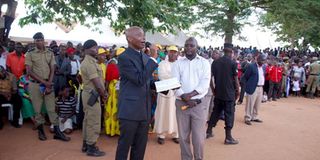I’m sorry over police brutality - Kayihura

Sorry. Inspector General of Police, Gen Kale Kayihura speaks during celebrations to mark his re-appointment as police chief at Nauyo Primary School in Mbale last Sunday. PHOTO BY YAHUDU KITUNZI
What you need to know:
- Uganda’s Constitution imposes on police the responsibility to protect life and property.
- In 2015, former prime minister Amama Mbabazi sought to launch his political consultations in Mbale as he made a bid for presidency.
The IGP on Sunday promised to use his new tenure to audit and retrain police detectives he said are wanting in investigative skills; recruit some 200 scene of crime officers to strengthen evidence gathering; improve accommodation and general welfare of police officers; and, build the Force’s leadership.
Mbale. Police chief Kale Kayihura has for the first time publicly apologised over police brutality against civilians after publication of gruesome photos of suspects tortured in custody sparked a political firestorm and wide condemnation.
“I ask people to forgive police for using excessive force sometimes when they execute their duties,” Gen Kayihura said, attributing the abuses to some of the officers not being up to policing task.
This is the Inspector General of Police’s (IGP) first contrite remarks on the reported cruel treatment of people detained in connection with the March 17 assassination of police spokesman Andrew Felix Kaweesi, his driver and bodyguard in a Kampala suburb.
The first batch of the suspects limped to court with open wounds and, with blistered palms in the air, pleaded with the presiding magistrate to order their immediate relocation from Nalufenya detention facility in Jinja District, where they said they were tortured, to Luzira Maximum Security Prison.
Weeks after, photographs were published by mainstream media and widely circulated on social media showing Kamwenge Mayor Geoffrey Byamukama crippled at Nakasero Hospital by septic wounds to the knees and ankles, which he said detectives inflicted on him.
Speaking on Sunday at celebrations to mark his re-appointment for a fifth three-year term as police chief, Gen Kayihura told Mbale residents that he had “forgiven” individuals maligning him and the police on social media.
“Let me pray for people who are against Uganda police to turn from hate to love. I have forgiven them,” he said.
Reported torture of suspects at Nalufenya, which the statutory Uganda Human Rights Commission in a report released last week, said involved plucking off of nails, mock executions and administering of electrical shocks on suspects, prompted Parliament to call for a closure of the facility all together.
Gen Kayihura, without directly addressing the Nalufenya situation or alleged recent torture incidents, however, acknowledged that “many mistakes are made by police because they are not well trained”.
“Police should protect the wanainchi (ordinary citizens), but not harass them,” he said, but took no command responsibility for the alleged violations that wayward elements in the Force perpetrate.
The fête at Nauyo Primary School in Mbale, the police chief said, had been organised not by himself as initially reported but by his admirers in political circles and police in the Mt Elgon region.
“What you have done; it’s not a small thing. I am like a born-again now and I thank God. I now know the reason why President Museveni started fighting [against] the bad government of Idi Amin from here,” he said.
His claim received endorsement from Mbale District chairperson Bernard Mujaasi and Mr Brian Mauso, the deputy national chairperson of crime preventers, a paramilitary police affiliate that Gen Kayihura created and superintends.
“I have seen a number of Inspector Generals of Police in Uganda, but Kayihura you are a different IGP; you have made Uganda proud,” Mr Mujaasi said, citing community policing as essential to declining crime in the country.
Police have for three years failed to release nation-wide crime statistics, making it difficult to discern with precision whether crime is on the rise or not. A spate of unexplained killings and burglaries in Kampala, Wakiso, Masaka and other districts have alarmed the population that human security - a key achievement of President Museveni’s government - is waning.
Uganda’s Constitution imposes on police the responsibility to protect life and property.
Speaking at a vigil for the slain police spokesman Kaweesi in March, President Museveni said criminals had infiltrated police and he asked Gen Kayihura to “clean up” the Force.
“Peace and stability should be available in this country. We don’t care about [what] the people [are] talking about you [Kayihura]. For us, we know you as a performer,” Mr Mauso, said.
Many in attendance were supporters of the ruling National Resistance Movement (NRM) party and donned Yellow T-shirts emblazoned with President Museveni’s image.
Elgon region, according to Gen Kayihura, is a political Mecca for freedom fighters. He declared no political ambitions of his own. In the 1970s, Mr Museveni, who at the time headed the Front for National Salvation (Fronasa), established a cell in the Elgon region to recruit for and advance interests of the rebel group. He later founded the National Resistance Army guerilla outfit, which enabled him to shoot his way to power in 1986.
In 2015, former prime minister Amama Mbabazi sought to launch his political consultations in Mbale as he made a bid for presidency.
He was, however, arrested at Jinja and prevented from continuing to Mbale.
His supporters, who had been waiting, engaged the police in riots, with the latter throwing teargas.
The IGP on Sunday promised to use his new tenure to audit and retrain police detectives he said are wanting in investigative skills; recruit some 200 scene of crime officers to strengthen evidence gathering; improve accommodation and general welfare of police officers; and, build the Force’s leadership.
Police crime investigators are discredited by bribe-taking, indolence and low skills, he said, requiring an overhaul.




